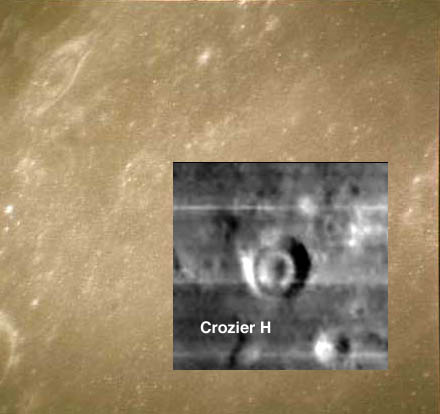Difference between revisions of "April 6, 2005"
| Line 3: | Line 3: | ||
<table width="85%" border="0" align="center" cellpadding="6" cellspacing="2"> | <table width="85%" border="0" align="center" cellpadding="6" cellspacing="2"> | ||
<tr> | <tr> | ||
| − | |||
</tr> | </tr> | ||
</table> | </table> | ||
| Line 21: | Line 20: | ||
<p align="center"><b>Donut</b></p> | <p align="center"><b>Donut</b></p> | ||
<p align="left">Recently Danny Caes, the indefatigable explorer of ancient Apollo photos, reported that he had found two images of the concentric crater Crozier H. This LPOD shows the Apollo 16 view (in a sepia tone to indicate antiquity) and a Lunar Orbiter IV view from a previous LPOD. At the high sun of the Apollo view the concentric crater (upper left corner) looks like a big donut in a small saucer (or for American readers, a Cheerio in a spoon). The inner ring does not look like a crater rim as it would if it were a chance impact in a pre-existing crater. It is very rounded and doesnt look like any other type of lunar landform. Previously I have suggested that inner rings of concentric craters could be some type of volcanic feature, but that is total speculation based on a lack of real evidence of what the rings are. I am stumped what do you think </p> | <p align="left">Recently Danny Caes, the indefatigable explorer of ancient Apollo photos, reported that he had found two images of the concentric crater Crozier H. This LPOD shows the Apollo 16 view (in a sepia tone to indicate antiquity) and a Lunar Orbiter IV view from a previous LPOD. At the high sun of the Apollo view the concentric crater (upper left corner) looks like a big donut in a small saucer (or for American readers, a Cheerio in a spoon). The inner ring does not look like a crater rim as it would if it were a chance impact in a pre-existing crater. It is very rounded and doesnt look like any other type of lunar landform. Previously I have suggested that inner rings of concentric craters could be some type of volcanic feature, but that is total speculation based on a lack of real evidence of what the rings are. I am stumped what do you think </p> | ||
| − | <blockquote><p align="right">— [mailto:tychocrater@yahoo.com Chuck Wood]</blockquote> | + | <blockquote> |
| − | <p align="left" | + | <p align="right">— [mailto:tychocrater@yahoo.com Chuck Wood]</blockquote> |
| + | <p align="left"><b>Related Links:</b><br> | ||
Rukl Plate 48 | Rukl Plate 48 | ||
<p align="left"><b>Tomorrow's LPOD: </b> Northern Arc</p> | <p align="left"><b>Tomorrow's LPOD: </b> Northern Arc</p> | ||
Revision as of 18:20, 17 January 2015
Donut
Image Credit: Apollo 16 and Lunar Orbiter IV
|
|
Donut Recently Danny Caes, the indefatigable explorer of ancient Apollo photos, reported that he had found two images of the concentric crater Crozier H. This LPOD shows the Apollo 16 view (in a sepia tone to indicate antiquity) and a Lunar Orbiter IV view from a previous LPOD. At the high sun of the Apollo view the concentric crater (upper left corner) looks like a big donut in a small saucer (or for American readers, a Cheerio in a spoon). The inner ring does not look like a crater rim as it would if it were a chance impact in a pre-existing crater. It is very rounded and doesnt look like any other type of lunar landform. Previously I have suggested that inner rings of concentric craters could be some type of volcanic feature, but that is total speculation based on a lack of real evidence of what the rings are. I am stumped what do you think Related Links: Tomorrow's LPOD: Northern Arc |
|
Author & Editor: Technical Consultant: Contact Translator: A service of: |
COMMENTS?
Register, and click on the Discussion tab at the top of the page.




